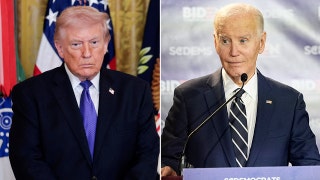New document shows FBI used intelligence briefing to advance Russia probe
Trump accuses Obama administration of 'treason'; Fox News contributor Sarah Sanders reacts.
The Senate Intelligence Committee found that the FBI gave the unverified anti-Trump dossier “unjustified credence,” and that Russia “took advantage” of members of the Trump transition team’s “relative inexperience in government” in its final report as part of its years-long bipartisan Russia investigation.
The panel on Tuesday released the fifth and final volume of its five-part report on Russian interference in the 2016 presidential election.
"Over the last three years, the Senate Intelligence Committee conducted a bipartisan and thorough investigation into Russian efforts to influence the 2016 election and undermine our democracy," Acting Senate Intelligence Committee Chairman Marco Rubio, R-Fla., said in a statement Tuesday. "We interviewed over 200 witnesses and reviewed over 1 million pages of documents."
He added: "No probe into this matter has been more exhaustive."
“We can say, without any hesitation, that the Committee found absolutely no evidence that then-candidate Donald Trump or his campaign colluded with the Russian government to meddle in the 2016 election,” Rubio said. “What the Committee did find, however, is very troubling.”
Rubio detailed the committee’s findings, which included “irrefutable evidence of Russian meddling” and “deeply troubling actions taken” by the FBI, “particularly their acceptance and willingness to rely on the ‘Steele Dossier’ without verifying its methodology or sourcing.”
The committee found that the FBI gave the dossier, authored by ex-British intelligence agent Christopher Steele, “unjustified credence, based on an incomplete understanding of Steele’s past reporting record.
“The FBI used the dossier in a FISA application and renewals, and advocated for it to be included in the Intelligence Community Assessment before taking the necessary steps to validate assumptions about Steele’s credibility,” the committee found.
The findings come after the first charge in U.S. Attorney John Durham's case pertaining to former FBI lawyer Kevin Clinesmith misrepresenting a detail in those FISA applications.
OBAMA ADMINISTRATION WAS ‘FROZEN’ IN COMBATTING 2016 RUSSIAN ELECTION MEDDLING: SENATE REPORT
But the committee said Tuesday that members of the 2016 Trump campaign presented “intelligence” targets.
The committee found that former Trump campaign chairman Paul Manafort’s “presence on the Trump campaign and proximity to then-candidate Trump created opportunities for Russian intelligence services to exert influence over, and acquire confidential information on, the Trump campaign.”
The committee noted that prior to Manafort joining the Trump campaign in March 2016, Manafort “directly and indirectly communicated” with Russian national, Konstantin Kilimnik and other pro-Russian oligarchs in Ukraine.
“On numerous occasions, Manafort sought to secretly share internal Campaign information with Kilimnik,” the report stated, while noting that the committee was “unable to reliably determine why Manafort shared sensitive internal polling data or Campaign strategy with Kilimnik or with whom Kilimnik further shared that information.”
The committee noted that it had “limited insight” into Kilimnik's communications with Manafort and into Kilimnik's communications with other individuals connected to Russian influence operations, all of whom used communications security practices.
“The Committee obtained some information suggesting Kilimnik may have been connected to the GRU's hack and leak operation targeting the 2016 U.S. election,” the report stated.
The committee found that “after the election, Manafort continued to coordinate with Russian persons, particularly Kilimnik and other individuals close to Oleg Deripaska, in an effort to undertake activities on their behalf.”
“Manafort worked with Kilimnik starting in 2016 on narratives that sought to undermine evidence that Russia interfered in the 2016 U.S. election,” the report found.
The committee added: “Taken as a whole, Manafort's high- level access and willingness to share information with individuals closely affiliated with the Russian intelligence services, particularly Kilimnik and associates of Deripaska, represented a grave counterintelligence threat.”
The committee also noted that former Trump campaign aide George Papadopoulos “was not a witting cooptee of the Russian intelligence services” but said that he “presented a prime intelligence target and potential vector for malign Russian influence.”
Both Manafort and Papadopoulos were charged in former Special Counsel Robert Mueller’s investigation.
DURHAM PROBE: EX-FBI LAWYER TO PLEAD GUILTY IN FIRST CRIMINAL CASE ARISING FROM REVIEW
The committee, though, said Tuesday that it “found no evidence that anyone associated with the Trump Campaign had any substantive private conversations” with Russian Ambassador Sergey Kislyak during the April 27, 2016, Trump speech held at the Mayflower Hotel.
But the committee did note that Russia “took advantage” of members of the Trump transition team and their “relative inexperience in government, opposition to Obama administration policies, and Trump’s desire to deepen ties with Russia to pursue unofficial channels through which Russia could conduct diplomacy.”
Meanwhile, the committee also said Tuesday that the FBI “lacked a formal or considered process for escalating their warnings” about the hack of the Democratic National Committee; while noting that WikiLeaks “actively sought, and played, a key role in the Russian influence campaign.”
The committee said WikiLeaks “likely knew it was assisting a Russian intelligence influence effort.”
Meanwhile, the committee shifted to the infamous Trump Tower meeting in June 2016, noting that “at least two participants” — Russian lawyer Natalia Veselnitskaya and Rinat Akhmetshin “have significant connections to the Russian government, including the Russian intelligence services.”
“The Committee, however, found no reliable evidence that information of benefit to the Campaign was transmitted at the meeting, or that then-candidate Trump had foreknowledge of the meeting,” the committee said.
The controversial meeting, when it was revealed in 2017, fueled allegations of Trump campaign coordination with Russia – as Donald Trump Jr. was apparently promised dirt from Veselnitskaya on Hillary Clinton’s supposed involvement with Russia.
The fourth volume of the report was released in April, and found that officials who drafted and prepared the 2017 Intelligence Community Assessment of Russian interference in the last presidential election “were under no political pressure” to reach “specific conclusions” and praised the “strong tradecraft” applied in creating the document.
The third volume of the report was released by the committee in February, and found that the Obama administration was “frozen” in combatting 2016 Russian election meddling and “not well-postured” to counter Russian interference.
Former Senate Intelligence Committee Chairman Richard Burr and Ranking Member Mark Warner found that the Obama administration “struggled to determine the appropriate response,” and stated that it was “frozen by ‘paralysis of analysis,’ hamstrung by constraints both real and perceived” and debated courses of action “without truly taking one.”
The second volume of the report was released by the committee last fall and urged President Trump to warn the public about efforts by foreign governments to interfere in U.S. elections and take steps to prevent hostile nations from using social media to meddle in the 2020 vote.
But for 2020, Burr has said that the U.S. is “in a better position to identify foreign interference efforts and address vulnerabilities Russia and other hostile foreign actors may seek to exploit.”
The first volume of the report provided new details on how Russian government hackers directed extensive activity against U.S. election infrastructure, and faulted the FBI and Department of Homeland Security for providing inadequate warnings to state governments.
The committee’s investigation into Russia meddling went on for more than two years, with senators on the panel having the chance to interview more than 200 people.
"We have no factual evidence of collusion between the Trump campaign and Russia," Burr said last year.
Former Special Counsel Robert Mueller last year also concluded his yearslong investigation into whether Trump campaign associates colluded with the Russian government to influence the 2016 election. Mueller found no evidence of criminal coordination or conspiracy.













































